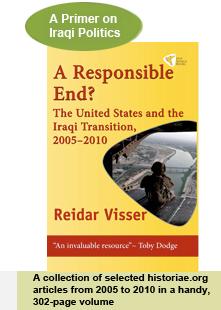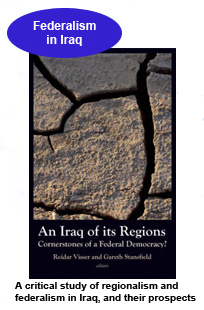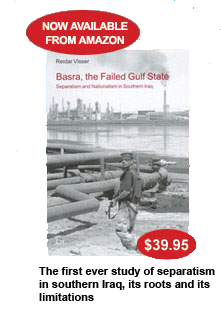



| Main | |
| Documents & images | |
| Links | |
| Contact | |
 | |
| amazon.com |

|
|
|
amazon.com
amazon.co.uk |
|

|
|
|
amazon.com
amazon.co.uk |
|
Basra Crude: The Great Game of Iraq’s “Southern” Oil
Background paper of relevance to the new Iraqi oil and gas law agreed on 26 February 2007, available as PDF file (15 pages).
Abstract
Concepts like “Shiite oil” and “Kurdish oil” obfuscate the debate about Iraq’s energy resources. This paper starts from the proposition that it would be better to call a thing by its name: in terms of the size of reserves, Iraqi oil is first and foremost Basra oil. Accounting for one of the world’s greatest concentrations of petroleum wealth, almost all of Iraq’s supergiant oil fields can be found near Basra or in one of its two neighbouring governorates. The other six Shiite-majority governorates of Iraq have little or no oil, and even the most optimistic estimates of new discoveries in Kurdistan pale in comparison with the reserves of Basra and the far south.
This problem is particularly pronounced with regard to the areas south of Baghdad, where the conflation in the international media of the terms “Shiite”, “Southern Iraq” and “oil” masks an intense battle for control currently underway between competing political currents within Iraq’s Shiite community. Basra is unusual in that the Supreme Council for the Islamic Revolution in Iraq (SCIRI) – the Shiite party that has accomplished the remarkable feat of becoming the favourite Iraqi partner of both Washington and Tehran – is completely on the sidelines in local government. Instead, other local factions and especially the Fadila party have dominated since 2005. In the same period, the idea that Basra could become a small-scale federal entity of its own, separated from the rest of the Shiite territories, has gained some ground, while traditional Iraqi nationalism also seems to remain surprisingly strong among the population at large. The implication is that SCIRI’s competing project of a single Shiite super-region south of Baghdad will suffer from a glaring defect unless something changes dramatically in Basra: it will have almost no oil resources.
This paper considers the effect of the Samarra bombing on 22 February 2006 on the power struggle in Basra. In Iraq in general, and in Baghdad in particular, the Samarra incident has fanned the flames of sectarianism, and SCIRI clearly has been the most successful Shiite party in navigating this new situation and turning it to its own advantage. However, in Basra, one year after the fateful blast, no such obvious Samarra effect is discernable. The main battle still seems to be between Basra regionalists and Iraqi nationalists, with SCIRI’s ideas about sectarian federalism continuing to attract less attention. Still, several factors could have an impact on this struggle in the near future. They include the timing and the modalities of the expected drawdown of British military forces from southern Iraq during 2007, and the possibility of a full UK withdrawal ahead of anticipated initiatives for the formation of federal regions in early 2008.
Perhaps the factor most likely to have an immediate impact is the new Iraqi oil and gas law (to be introduced to parliament in March 2007), discussed in the final section of the paper. Leaked drafts and early reports on the law agreed by the Iraqi government on 26 February suggest that Iraq’s federal state structure is now being deepened in two significant ways. Whereas early versions of the law had put governorates and federal regions on par with each other and with a relatively strong role for the central government in overseeing the oil sector as a whole, a recently leaked third draft likely to be close to the agreed compromise makes a greater distinction between federal regions and existing governorates. Also, instead of trying to demarcate the jurisdictions of the central government and provincial authorities, it boosts the powers of a new powerful executive body – the federal oil and gas council – which combines representatives of the federal and provincial levels of government. If these new features are confirmed by the Iraqi parliament, the incentives for seeking federal status for existing governorates – such as Basra – will become greater.
FULL PAPER AVAILABLE HERE (PDF)
Quoted in:
Christopher M. Blanchard, Iraq: Oil and Gas Legislation, Revenue Sharing, and
U.S. Policy, Congressional Research Service Report for Congress, October 2007.
Bassam Fattouh, How Secure Are Middle East Oil Supplies? Oxford Institute for Energy Studies, September 2007.
Full details of publication:
Reidar Visser, "Basra Crude: The Great Game of Iraq's "Southern" Oil" (NUPI Paper no. 723, Oslo: Norwegian Institute of International Affairs, 2007, 15 pages).
For related commentary see articles by AP (via USA Today), and in The Independent.
This document may be freely reproduced as long as http://historiae.org is credited as the source.
